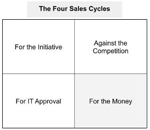Let's face it: if there was one sales call that needed to go well for a small SaaS company, the product-centric founder/CEO is probably the person we want to lead that call; however, is that approach scalable? Is the founder the best person to lead day- to-day sales?
Often, the company was started by a founder that comes from the industry that the new company is targeting. The founder, therefore, probably has a rolodex of potential customers that he/she is pursuing as the most likely prospective customers. What happens when that list of FOF's (Friends of the Founder) is exhausted? Is the founder really the best person to lead sales day-to-day, just because he/she is the most passionate and knowledgeable person about the product?
We accept that, in a company's early days, the founder takes on many roles, including that of sales leader. In fact, this approach may even yield some early success. But when is the right time for professional sales leadership to take the reins and develop a sales team to perform the sales functions? Is it as soon as outside funds are injected into the company? Is it at a certain ARR (Annual Recurring Revenue) threshold?
Perhaps the most difficult part of the transition to professional sales from founder-led sales is the inability of the founder to cede control of sales cycles. After all, the software is his/her "baby" and, metaphorically, allowing others to raise his/her baby can be a difficult transition emotionally. This fear of losing control often hamstrings the company's growth. But, it must be done.

The short answer, then, is: as soon as the founder is willing to hire professional sales, it is the right time for the founder to transition out of leading sales. When there is a significant investment into the company, it often proves to be an opportune time to transition into a professional sales-led company, thereby allowing the founder to focus on product development, finance, hiring or a myriad of other needs of the company.
Hiring professional sales talent is one thing, but installing a value-based sales and pricing methodology is equally important. While the founder focuses on selling to his/her industry cohorts, a professional team sells in accordance with an ROI model that leverages the unique capabilities of the product to drive more objective and consistent results into the target market that is best positioned to leverage the product capabilities.
Founders tend to lead with features, while professional salespeople tend to lead with the financial value driven directly by the product, supported by a compelling business case that aligns well with the prospective customers' key identified initiatives driven by a compelling event. Once completed, the founder will likely wish that he/she had made the transition sooner.
As if that is not enough, let me show you one more thing. Demonstrating that your product can be sold by more than one person can add significant value to you company. The metric that contemplates the "more than one person" effect is known as "Participation Rate" — the percentage of bag carriers that can hit quota. Our model below indicates that increasing the participation rate from 40% to 70% increases the revenue multiple by .5x. That is a big number.

Virtual Dave is an AI-based virtual sales support tool trained on 40 years of enterprise software sales experience, available 24/7 to enhance sales process consistency.
 The short answer, then, is: as soon as the founder is willing to hire professional sales, it is the right time for the founder to transition out of leading sales. When there is a significant investment into the company, it often proves to be an opportune time to transition into a professional sales-led company, thereby allowing the founder to focus on product development, finance, hiring or a myriad of other needs of the company.
The short answer, then, is: as soon as the founder is willing to hire professional sales, it is the right time for the founder to transition out of leading sales. When there is a significant investment into the company, it often proves to be an opportune time to transition into a professional sales-led company, thereby allowing the founder to focus on product development, finance, hiring or a myriad of other needs of the company. 



.jpeg?width=352&name=Photo%20-%20shutterstock_1972218197%20(small).jpeg)
